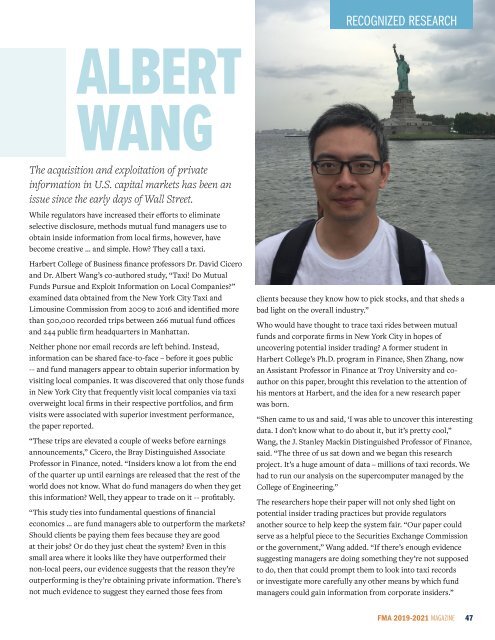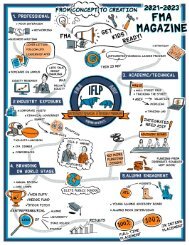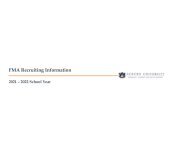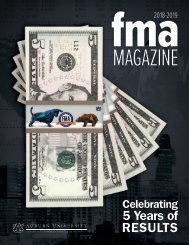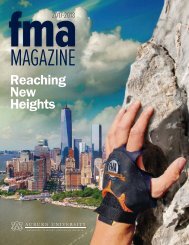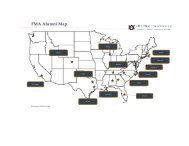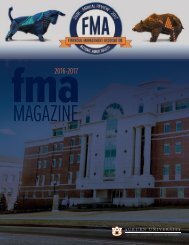2019 - 2021 FMA Magazine
FMA Magazine covers events and programming for 2019 - 2021, including Auburn University Student Investment Fund performance.
FMA Magazine covers events and programming for 2019 - 2021, including Auburn University Student Investment Fund performance.
- No tags were found...
Create successful ePaper yourself
Turn your PDF publications into a flip-book with our unique Google optimized e-Paper software.
RECOGNIZED RESEARCH<br />
ALBERT<br />
WANG<br />
The acquisition and exploitation of private<br />
information in U.S. capital markets has been an<br />
issue since the early days of Wall Street.<br />
While regulators have increased their efforts to eliminate<br />
selective disclosure, methods mutual fund managers use to<br />
obtain inside information from local firms, however, have<br />
become creative ... and simple. How? They call a taxi.<br />
Harbert College of Business finance professors Dr. David Cicero<br />
and Dr. Albert Wang’s co-authored study, “Taxi! Do Mutual<br />
Funds Pursue and Exploit Information on Local Companies?”<br />
examined data obtained from the New York City Taxi and<br />
Limousine Commission from 2009 to 2016 and identified more<br />
than 500,000 recorded trips between 266 mutual fund offices<br />
and 244 public firm headquarters in Manhattan.<br />
Neither phone nor email records are left behind. Instead,<br />
information can be shared face-to-face – before it goes public<br />
-- and fund managers appear to obtain superior information by<br />
visiting local companies. It was discovered that only those funds<br />
in New York City that frequently visit local companies via taxi<br />
overweight local firms in their respective portfolios, and firm<br />
visits were associated with superior investment performance,<br />
the paper reported.<br />
“These trips are elevated a couple of weeks before earnings<br />
announcements,” Cicero, the Bray Distinguished Associate<br />
Professor in Finance, noted. “Insiders know a lot from the end<br />
of the quarter up until earnings are released that the rest of the<br />
world does not know. What do fund managers do when they get<br />
this information? Well, they appear to trade on it -- profitably.<br />
“This study ties into fundamental questions of financial<br />
economics … are fund managers able to outperform the markets?<br />
Should clients be paying them fees because they are good<br />
at their jobs? Or do they just cheat the system? Even in this<br />
small area where it looks like they have outperformed their<br />
non-local peers, our evidence suggests that the reason they’re<br />
outperforming is they’re obtaining private information. There’s<br />
not much evidence to suggest they earned those fees from<br />
clients because they know how to pick stocks, and that sheds a<br />
bad light on the overall industry.”<br />
Who would have thought to trace taxi rides between mutual<br />
funds and corporate firms in New York City in hopes of<br />
uncovering potential insider trading? A former student in<br />
Harbert College’s Ph.D. program in Finance, Shen Zhang, now<br />
an Assistant Professor in Finance at Troy University and coauthor<br />
on this paper, brought this revelation to the attention of<br />
his mentors at Harbert, and the idea for a new research paper<br />
was born.<br />
“Shen came to us and said, ‘I was able to uncover this interesting<br />
data. I don’t know what to do about it, but it’s pretty cool,”<br />
Wang, the J. Stanley Mackin Distinguished Professor of Finance,<br />
said. “The three of us sat down and we began this research<br />
project. It’s a huge amount of data – millions of taxi records. We<br />
had to run our analysis on the supercomputer managed by the<br />
College of Engineering.”<br />
The researchers hope their paper will not only shed light on<br />
potential insider trading practices but provide regulators<br />
another source to help keep the system fair. “Our paper could<br />
serve as a helpful piece to the Securities Exchange Commission<br />
or the government,” Wang added. “If there’s enough evidence<br />
suggesting managers are doing something they’re not supposed<br />
to do, then that could prompt them to look into taxi records<br />
or investigate more carefully any other means by which fund<br />
managers could gain information from corporate insiders.”<br />
<strong>FMA</strong> <strong>2019</strong>-<strong>2021</strong> MAGAZINE 47


